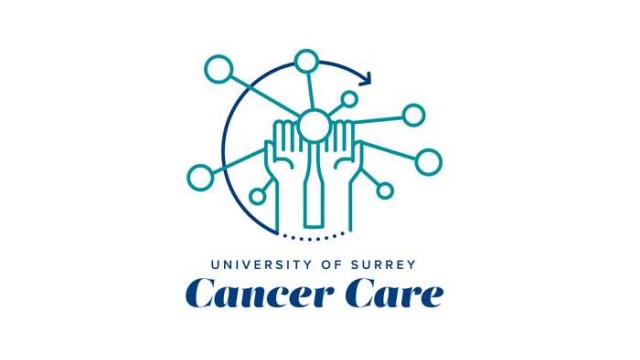
Understanding and addressing inequities in cancer care for people with a learning disability
Overall summary
People with a learning disability are not diagnosed with cancer as quickly as people without a learning disability. This means that by the time they are diagnosed their cancer is more advanced and harder to treat. We do not have a lot of information about what happens when people with a learning disability have cancer-related symptoms, or what can support a timely diagnosis.
Researchers at the University of Surrey are working with colleagues at Queen Mary University London, University of Exeter, University College London, University of Oxford and experts by experience to understand and address inequities in cancer care experienced by people with a learning disability.
Experts by experience
People with a learning disability are involved in our research as co-applicants and advisors. They ensure that the questions we ask are relevant and meaningful for people with a learning disability and that the materials we use in recruitment and dissemination are inclusive.
Researchers at the University of Surrey

Dr Sarah Beck
Research Fellow

Dr Anna Cox
Senior Lecturer in Health and Social Care

Hannah Drysdale
Research Fellow in Health Inequalities
Mar Estupiñan Fernandez De Mesa
Fellow in Cancer Care

Natalie Gil
Postgraduate Researcher

Esra Hassan
Research Fellow

Dr Arsene Hobabagabo
Postgraduate Researcher

Dr Robert Kerrison
Associate Professor and Co-Lead for Cancer Care

Lizzie Merrill
Research Fellow in Cancer Care

Professor Katriina Whitaker
Professor of Psychology and Co-Lead for Cancer Care
CancerLearn

We are working on CancerLearn with Queen Mary University London and the University of Exeter. This study is funded from 2024-2027 by NIHR HSDR. Two current projects within CancerLearn are described below.
Project 1: Innovations to support symptomatic cancer diagnostic pathways for people with a learning disability: A scoping review
We would like to find out what innovations have been developed that could support symptomatic cancer diagnostic pathways for adults with a learning disability in primary, secondary care, and community settings.
We are searching for all existing published evidence of innovations that support timely diagnosis of cancer for people with a learning disability; we would like to identify all internationally published studies since 2014.
Some of the questions we will be asking include:
- What innovations have been developed with the aim to improve symptomatic cancer diagnostic pathways for adults with a learning disability?
- What innovations have been developed with the aim to improve access to healthcare for adults with a learning disability, that may also improve symptomatic cancer diagnostic pathways?
- Where are innovations based (country/location)?
- Which cancer types do innovations support?
- What settings are innovations delivered in (primary care, secondary care, or the community)?
- Are the innovations focused on a particular subgroup of people with a learning disability?
- What theory or frameworks underpin the innovations?
- Have people with a learning disability been involved in the design of the innovations?
Project 2: Understanding how medical symptoms are managed and diagnosed for people with a learning disability.
We will observe and explore (through interviews) the experiences of people in three places in England to understand what prevents or helps a timely diagnosis of cancer for people with a learning disability. We will observe and/or interview people with a learning disability and those people who support them to find out if they have cancer, for example their family, carers, doctors and nurses, people from local healthcare and social care organisations and charity workers.
This study will help us to understand why there are delays in diagnosing cancer in people with a learning disability and make recommendations for how this could be improved.
Outputs/resources
Whitaker, K. L., Cox, A., McErlean, G., Pal, A., Stansbury, K., Estupiñán Fez de Mesa, M., Kerrison, R. S., Gil, N., Marcu, A., Armes, J., Yap, M. L., Delaney, G. P., Hoyo, C., Integrating Implementation Theory to Address Inequities in Cancer Care: Perspectives from an International Working Group, European Journal of Cancer Care, 2024. https://doi.org/10.1155/2024/9994508
Gil, N., Whitaker, K.L., Kerrison, R., Drysdale, H., Black, G., Mounce, L., Northway, R., Cox, A. Innovations to Support Symptomatic Cancer Diagnostic Pathways for People with a Learning Disability: A Scoping Review https://dx.doi.org/10.17504/protocols.io.kqdg314rql25/v1, 2025.
Researchers at the University of Surrey

Dr Anna Cox
Senior Lecturer in Health and Social Care
Biography
Anna is a Senior Lecturer in Health and Social Care in the School of Health Sciences at the University of Surrey. Her research focuses on the development and implementation of interventions to support the provision of good ethical care throughout the life course. Anna has a particularly interest in the care experience of older people and people with learning disabilities. Anna leads the Together Project funded by NHSE Workforce Training and Education Directorate, South East Region and the National Institute for Health and Care Research Applied Research Collaboration Kent, Surrey and Sussex. The Together Project: Supporting the delivery of good practice in maternity services for parents with learning disabilities | University of Surrey


Dr Robert Kerrison
Associate Professor and Co-Lead for Cancer Care
Biography
Robert Kerrison is an Associate Professor in Cancer Care and Co-Lead for the Cancer Care Expert Group (School of Health Sciences). Rob's ongoing programme of work focuses on inequalities across the cancer pathway, from symptom awareness, screening and early diagnosis, through to treatment. He holds several awards as principal investigator, including a prestigious Cancer Research Fellowship and Breast Cancer Now Project Grant. He is also a co-investigator on a number of research programmes, including the NIHR Policy Research Unit for Cancer Awareness, Screening and Early Diagnosis, and an NIHR Health and Social Care Delivery Research Award ('Cancer-Learn').
Rob's external appointments include Co-chair of the World Endoscopy Organisation (WEO) Coalition to Reduce Inequities in Colorectal Cancer Screening and Co-chair of the Multi-Cancer Early Detection (MCED) Test Consortium's Communication Work group.
His internal roles include Open Research Champion for the School of Health Sciences, Module Lead for the Research Design and Methodology and Theme Lead for Individuals, Organisations and Society.

Professor Katriina Whitaker
Professor of Psychology and Co-Lead for Cancer Care
Biography
Katriina Whitaker is Professor of Psychology in the School of Health Sciences at the University of Surrey and co-leads the Cancer Care group with Rob Kerrison. Katriina's own programme of work focuses on early diagnosis and cancer, with a particular interest in healthcare-seeking and health inequalities. Katriina is a Chartered Psychologist and was made a Fellow of the British Psychological Society in 2017. Katriina is an expert review panel member for Cancer Research UK's Early Diagnosis & Detection Trials, Behavioural Health System and Health Economics research panel.

Hannah Drysdale
Research Fellow in Health Inequalities
Biography
Hannah is a Research Fellow in Health Inequalities in the School of Health Sciences at the University of Surrey. She is currently working on the CancerLearn project, an NIHR funded research programme, which aims to understand inequalities in cancer diagnostic outcomes for people with learning disabilities. Hannah's other interests include researching inequalities in cervical cancer screening, with a particular focus on the planned introduction of HPV vaginal self-sampling into the NHS cervical screening programme. She also works on the DISTINCT project, a collaboration between the Institute of Cancer Research and Queen Mary University of London, which is exploring public views on collecting data to monitor inclusivity of cancer clinical trials.

Lizzie Merrill
Research Fellow in Cancer Care
Biography
Lizzie Merrill is a Research Fellow in Cancer Care in the School of Health Sciences. Her fellowship explores inequalities in cancer care among marginalised groups, aiming to identify, understand, and address these disparities.
Lizzie’s academic background is interdisciplinary, with a BA in Fine Art and an MSt in Women’s Studies. Her research interests include the lived experiences of people with cancer, art-based interventions, and interdisciplinary feminist methodologies.
She recently completed her PhD at the University of York, where she developed and applied a new creative visual method - Photofantasy, inspired by the artist Jo Spence - to explore and express individuals’ experiences of cancer.
Policy Research Unit in Cancer Awareness, Early Diagnosis and Screening
About
The NIHR Policy Research Unit on Cancer Awareness, Screening and Early Diagnosis (2024-2028) aims to support policymaking by generating evidence to help the NHS to diagnose people with cancer at an earlier disease stage. We are working with University College London, University of Oxford, University of Cambridge, and University of Leicester across three themes: supporting people, supporting health and social care professionals, and supporting policymakers.
Project 1: Candidacy and accessing primary care services: A systematic scoping review of quantitative surveys.
Access to primary care services improves health outcomes, increases life expectancy, enhances patient experience, and reduces costs to the healthcare system. Inequalities in access to primary care services particularly affect vulnerable populations and those with greater needs (e.g., people with a learning disability).
The Candidacy Framework can help us understand and identify intertwined and multilevel factors influencing people’s access to general practice and their subsequent journeys along the care pathway. The framework encompasses seven stages; identification of candidacy, navigation, permeability of services, appearance at health services, adjudications, offers and resistance, and operation conditions.
However, there is a knowledge gap relating to validated quantitative surveys available to assess how patients identify themselves as candidates to access primary care services, and to assess variation (from a candidacy lens) in patient symptoms awareness, health seeking-behaviours, and their experience with these entry-point healthcare services.
We aim to identify surveys that assess access to primary care services (general practice) and patient care experience. We will then map survey questions and items to the seven stages of the Candidacy Framework.
The information we collect will help us to develop an accessible quantitative survey that will capture the experience of diverse populations accessing primary care services.
Project 2: Developing a novel candidacy survey to understand cancer awareness and help-seeking behaviours in people with a learning disability.
Many people struggle to get the healthcare they need, and this is even harder for people with a learning disability. In the UK, it is estimated that 2% of people have a learning disability, many of whom will face serious health problems. They are more likely to have illnesses that could be prevented or treated, and they often get diagnosed too late. For example, people with a learning disability are four times more likely to die from treatable conditions.
One significant barrier to equitable healthcare is that services are often difficult to understand and navigate. Many people with a learning disability find it difficult to explain symptoms, book appointments, and be taken seriously by doctors. Policies often focus on reducing waiting times but do not help people with a learning disability recognise symptoms or seek help when needed.
We need a way to assess how people with a learning disability understand their health needs and seek help, especially for serious conditions like cancer. Current health surveys are not designed for people with a learning disability. Our study will create an accessible survey to help people with a learning disability share their healthcare experiences. We will work with people with learning disabilities to develop an inclusive survey, this is likely to include a focus on plain English and pictures.
Outputs/resources
Estupiñán Fdez. de Mesa, M., Hobabagabo, A., Hassan, E., Friedemann Smith, C., Cox, A., von Wagner, C., Kerrison, R., Whitaker, K.L. Candidacy and accessing primary care services: A systematic scoping review of quantitative surveys, OSF.
University of Surrey researchers

Professor Katriina Whitaker
Professor of Psychology and Co-Lead for Cancer Care
Biography
Katriina Whitaker is Professor of Psychology in the School of Health Sciences at the University of Surrey and co-leads the Cancer Care group with Rob Kerrison. Katriina's own programme of work focuses on early diagnosis and cancer, with a particular interest in healthcare-seeking and health inequalities. Katriina is a Chartered Psychologist and was made a Fellow of the British Psychological Society in 2017. Katriina is an expert review panel member for Cancer Research UK's Early Diagnosis & Detection Trials, Behavioural Health System and Health Economics research panel.

Dr Robert Kerrison
Associate Professor and Co-Lead for Cancer Care
Biography
Robert Kerrison is an Associate Professor in Cancer Care and Co-Lead for the Cancer Care Expert Group (School of Health Sciences). Rob's ongoing programme of work focuses on inequalities across the cancer pathway, from symptom awareness, screening and early diagnosis, through to treatment. He holds several awards as principal investigator, including a prestigious Cancer Research Fellowship and Breast Cancer Now Project Grant. He is also a co-investigator on a number of research programmes, including the NIHR Policy Research Unit for Cancer Awareness, Screening and Early Diagnosis, and an NIHR Health and Social Care Delivery Research Award ('Cancer-Learn').
Rob's external appointments include Co-chair of the World Endoscopy Organisation (WEO) Coalition to Reduce Inequities in Colorectal Cancer Screening and Co-chair of the Multi-Cancer Early Detection (MCED) Test Consortium's Communication Work group.
His internal roles include Open Research Champion for the School of Health Sciences, Module Lead for the Research Design and Methodology and Theme Lead for Individuals, Organisations and Society.

Dr Sarah Beck
Research Fellow
Biography
Sarah is a Research Fellow and Health Psychologist at the University of Surrey with expertise in mixed-methods research. Her doctoral thesis explored the association between rumination and psychological and physical health outcomes in those diagnosed with cancer.
Since completing her PhD, Sarah has spent the last two years working as a research fellow across multiple projects. This has included an evaluation of the implementation of Schwartz Rounds in Higher Education Institutions. She currently project manages TEAM-QI, an intervention aimed at improving teamwork in multidisciplinary teams, and is working on the CARES-Well project, a collaborative partnership with colleagues in practice to create healthier workplaces. Within CARES-Well Sarah focuses on knowledge mobilisation and building system capacity.
Outside of these roles, Sarah is currently an Early Career Researcher (ECR) Rep for the School of Health Sciences.

Dr Anna Cox
Senior Lecturer in Health and Social Care
Biography
Anna is a Senior Lecturer in Health and Social Care in the School of Health Sciences at the University of Surrey. Her research focuses on the development and implementation of interventions to support the provision of good ethical care throughout the life course. Anna has a particularly interest in the care experience of older people and people with learning disabilities. Anna leads the Together Project funded by NHSE Workforce Training and Education Directorate, South East Region and the National Institute for Health and Care Research Applied Research Collaboration Kent, Surrey and Sussex. The Together Project: Supporting the delivery of good practice in maternity services for parents with learning disabilities | University of Surrey

Esra Hassan
Research Fellow
Biography
Esra is a research fellow working on the NIHR Policy Research Unit for Cancer Awareness, Screening and Early Diagnosis.
Esra is an interdisciplinary, quantitative researcher with a background in dementia, public health, clinical neuroscience, and psychology. She did her PhD at Brighton and Sussex Medical School, Centre for Dementia Studies. Her research focused on the determinants of dementia attitudes in young people, with the aim of identifying targets for public health intervention (modifiable factors and at-risk socio-demographic groups). Her work involved using structural equation modelling to understand the mediatory mechanisms driving dementia attitudes.
Esra also holds an MSc in Clinical Neuroscience from the University of Roehampton. Her MSc dissertation was based in molecular cancer biology, and explored the role of HOXA9 in mediating PARPi (Temozolomide and Olaparib) resistance in glioblastoma multiforme.
Outside of research, Esra has been actively involved in outreach for the past 10 years. Examples include being a mentor for the Diana Award for their social action programme for schools, STEM ambassador, and other global social action projects in the humanitarian sector.

PhD studentship: Improving early cancer diagnosis for adults with a learning disability.
Summary
Natalie Gil is completing a funded PhD supervised by Rob Kerrison, Anna Cox and Katriina Whitaker. This mixed methods project will synthesize existing empirical evidence on cancer-related risk-factor and symptom awareness among adults with a learning disability, explore differences in diagnostic intervals between adults with and without a learning disability, and understand lived experiences of the pathway to cancer diagnosis for people with a learning disability.
Outputs/ resources
Gil, N., Cox, A., Whitaker, K.L., Kerrison, R.S. (2024)Cancer risk-factor and symptom awareness among adults with intellectual disabilities, paid and unpaid carers, and healthcare practitioners. A scoping review., Journal of Intellectual Disability Research, 68(3) pp. 193-211.
Gil, N., Cox, A., Whitaker, K.L., Kerrison, R. S. (2022) Inequity in HPV vaccination, primary HPV screening, and sexual health education for people with learning disabilities, autism, and severe mental illness: A discussion. Quantitative and Qualitative Community Nursing Research, 10 (4).
Related sustainable development goals




